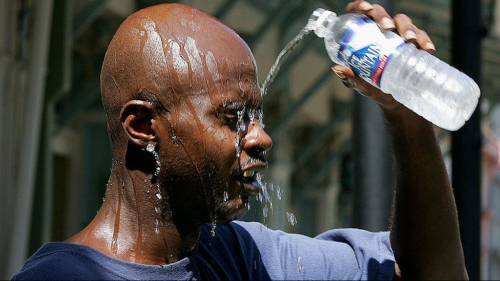This year, hotter than average temperatures have become the new normal. The Centers for Disease Control and Prevention (CDC) estimates that heat kills an average of roughly 700 Americans a year, research shows that heat likely plays a role in far more deaths in the United States. As a matter of fact, death from heat stroke is highest in the African American community. Blacks are 1.5 times more likely to die from the condition than whites.
So, as the temps soar, it is important to recognize the signs of heat stroke and what to do.
When combined with dehydration, heat stroke can damage the brain and internal organs, and may even be fatal. Heat stroke is a medical emergency, and 911 or any other emergency services should be called as soon someone suspects this to be the cause.
Symptoms
- Muscle cramps
- Heavy sweating
- Pale or cold skin
- Weakness and/or confusion
- Dizziness
- Headache
- Nausea or vomiting
- Rapid heartbeat
- Dark-colored urine, which indicates dehydration
Warning signs
- Fever of 104°F or higher
- Flushed or red skin
- Lack of sweating
- Trouble breathing
- Fainting
- Seizures
Causes
Plain and simple, heat stroke occurs when your body overheats after you’ve been exposed to the sun for too long a period and your body is unable to cool itself down. A body temperature of 104°F (40°C) or higher indicates heat stroke. This condition can affect anyone but mostly folks over age 50 are hit hardest. On hot, humid days, the increased moisture in the air slows down the sweating process which helps keep you cool.
There are factors that can make you a candidate for heatstroke:
- Dehydration
- Wearing warm or heavy clothing like a uniform
- Obesity
- Lack of sleep
- Being unaccustomed to the heat, such as moving from a cooler climate to a warmer one
- Taking allergy drugs, diuretics (water pills), laxatives, blood pressure or heart medicines
- Antidepressants
- Living in a poorly ventilated space
- Having suffered a previous heat stroke
- Using illicit drugs (cocaine, heroin, amphetamines and ecstasy)
Diagnosis and medical treatment
A doctor will perform a battery of tests to rule out other medical issues that can contribute to a high body temp. Tests may include a CAT scan, blood work and spinal tap. Your kidneys will also be examined to make sure they are functioning normally. Heat stroke and dehydration can seriously tax your kidneys.
You can expect to be hospitalized for one day or more depending on the complications of the heat stroke.
If your diagnosis is heat stroke, a doctor will try to lower your body temp by spraying you with water, blowing cool air on your body, or wrapping you loosely in wet sheets. Ice packs may also be used and placed strategically on your neck, armpits, and groin area.
If the preferred tried and true methods mentioned failed to bring your body temp down, a doctor may try flushing the stomach or rectum with cold water. Severe cases may require cardiopulmonary bypass, in which the person’s blood is diverted from the heart and lungs into a collection machine, cooled, and then returned to the body.
In some cases, anti-seizure or muscle-relaxing medications may be given to control convulsions and shivering. Aspirin and acetaminophen (Tylenol) do not help lower body temperature when a person has heat stroke, so these meds should be avoided.
Prevention
Heat stroke is preventable but you have to play it smart when the temps are extreme:
- Hydrate! Drink plenty of water throughout the day
- Stay inside and cool the air by using an air conditioner or fan
- Wear lightweight clothing that have a loose weave
- Skip strenuous activities
- Lay off caffeinated drinks and alcohol as these can contribute to dehydration
Word to the wise…
If you begin to feel nauseous, headachy, tired, get out of the heat, and cool off pronto! Get to an air conditioned space, take a cool shower, drink lots of water, or even hose off, doing any of these things should bring your body temp down. Treating heat stroke promptly lessens your risk for serious complications like kidney or liver damage, congestive heart failure, heart arrhythmias, coma, or even death.
If you have suffered a heat stroke in the past, you are susceptible to them. Do not take any unnecessary risks with your health when it’s sweltering outside.











